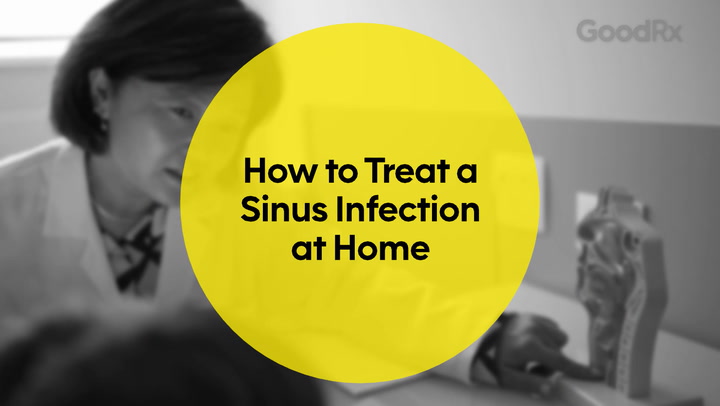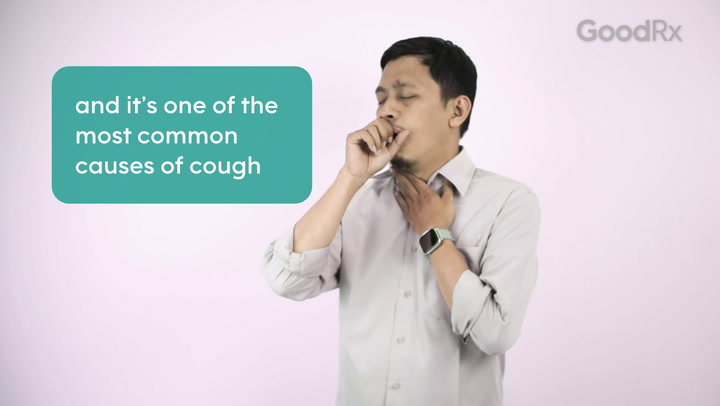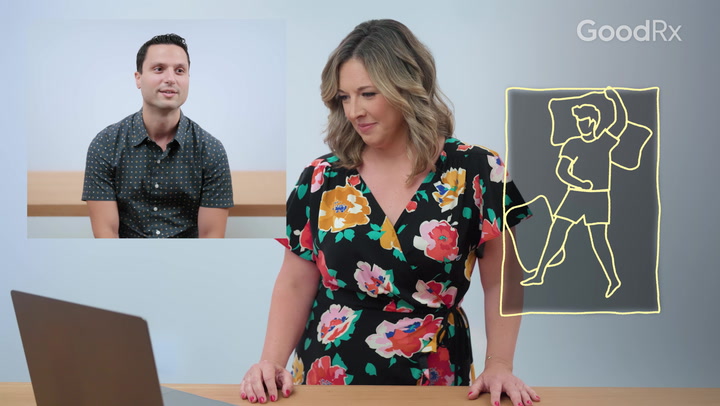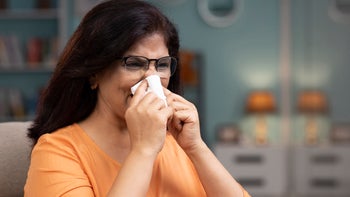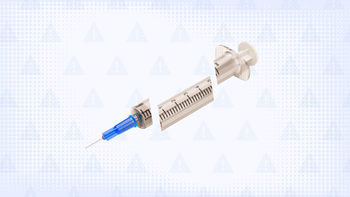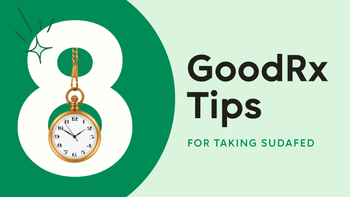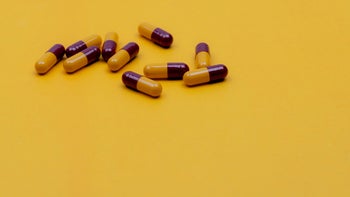
Sinusitis Medications: 5 Over-the-Counter Options for Sinus Infections
Key takeaways:
Over-the-counter (OTC) medications won’t cure a sinus infection (sinusitis). But they can help relieve your symptoms.
Helpful OTC sinusitis medications include decongestants, pain relievers, and steroid nasal sprays. A nasal saline rinse can also be a helpful, medication-free option.
Talk to a healthcare professional before using OTC sinusitis medications. They can help make sure you use OTC treatments that are safe for you.
Table of contents

Does the pain and pressure from sinusitis (sinus infection) have you totally wiped out on the couch? Are you scouring the internet, desperate for anything that might help? If so, we’ll be able to point you toward a source of relief.
Home care with over-the-counter (OTC) medications is usually recommended to help you feel better during a sinus infection. So it’s not surprising that people in the U.S. spend more than $1 billion each year on OTC sinusitis remedies. But with so many options out there, what should you use?
Let’s take a look at which OTC sinusitis medications are helpful, and which ones you should avoid.
Search and compare options
Can sinusitis be treated with OTC medications?
OTC medications can help relieve sinusitis symptoms and make you more comfortable. But they don’t cure the infection. Think of it like using an umbrella during a rainstorm. An umbrella won’t stop the rain. But it’ll make you more comfortable while you wait for the weather to clear.
Sinusitis happens when the air-filled pockets inside your sinuses — which are located in your head near your nose and eyes — become swollen and filled with fluid. This collection of fluid can then sometimes become infected.
Sinusitis is often caused by viruses and will get better on its own without antibiotics. But some cases of sinusitis may be caused by bacteria and require antibiotics. Other times, sinusitis isn’t caused by germs at all. For example, allergies can cause sinusitis — but this isn’t an infection. Your primary care provider can determine if you need an antibiotic for your sinusitis.
Common symptoms of sinusitis include:
Pain or pressure in your face
Headache
Stuffy nose
Runny nose
Mucus dripping down the throat (postnasal drip)
Sore throat
Cough
Which OTC sinus medications and treatment options help with sinusitis symptoms?
There are several OTC sinus medications and treatments available. Here, we’ll review five OTC products to consider.
1. Pain relievers
OTC pain relievers can help with headaches and facial pain caused by sinus infections. They include medications like:
Tylenol (acetaminophen)
Advil or Motrin (both brand names of ibuprofen)
Aleve (naproxen)
You can use any of these OTC pain relievers to help with sinusitis pain. But, it’s best to take one type of pain reliever at a time. And carefully read the package instructions since doses are different between products. Never take more OTC pain medication than the maximum listed on the package. Taking more can lead to dangerous side effects.
It’s also a good idea to check with a healthcare professional to make sure OTC pain relievers are safe for you. Some pain medications should be avoided if you have certain health conditions, like high blood pressure, or if you take certain medications, like blood thinners.
2. Neti pots and saline nasal washes
Neti pots and saline nasal washes use saline (salt water) to help remove mucus from your nasal passages. This is a medication-free option and is recommended by experts.
Saline nasal washes can be safe and effective when used correctly. Always follow the instructions when mixing saline solution at home. Only use distilled or sterile water. You can sterilize your tap water before using it by boiling it for 3 to 5 minutes and letting it cool until it’s lukewarm.
3. Steroid nasal sprays
Corticosteroid (“steroid”) nasal sprays treat inflammation and swelling in the nasal passages. This swelling causes a stuffy nose and facial pain, two of the biggest symptoms of sinusitis. OTC steroid nasal sprays include Flonase (fluticasone) and Nasacort (triamcinolone).
Steroid nasal sprays are usually used once per day and are safe for many people to use long-term, if needed. Side effects are rare and mild but may include nosebleed, itchy nose, or headache. Steroid nasal sprays need to be used correctly and consistently to work. And it may take several days to feel maximum relief.
4. Decongestant nasal sprays
Decongestant nasal sprays shrink blood vessels in the nasal passages. This helps relieve swelling. Popular decongestant nasal sprays include Afrin (oxymetazoline) and Neo-Synephrine (phenylephrine).
Decongestant nasal sprays work fast, but they should only be used for about 3 to 5 days. Overusing decongestant sprays can cause rebound congestion. This is when your nasal passages become dependent on the decongestant and swell up without it. Consider decongestant nasal sprays for short-term use only.
5. Oral decongestants
Similar to nasal decongestants, oral decongestants work by tightening blood vessels in the nose. This lessens swelling and makes it easier to breathe again.
Sudafed (pseudoephedrine) is a well-known oral decongestant. It’s kept behind the pharmacy counter, and you’ll have to show a photo ID to purchase it. There’s also restrictions on how much you can buy per day and per month.
Sudafed can cause side effects, such as anxiety, headache, or trouble sleeping. It can also temporarily raise your heart rate and blood pressure. Because of these side effects, it’s recommended to take Sudafed for no more than 7 days without a healthcare professional’s OK.
Talk to your primary care provider before taking Sudafed if you have any of the following health conditions:
High blood pressure
Prostate problems
Thyroid problems
Block quote:
Good to know: Oral phenylephrine (Sudafed PE) is no longer considered effective for nasal congestion. It’s not harmful to take, but it likely won’t provide any benefit. Check out our guide on phenylephrine alternatives for more details.
Which OTC medications don’t help with sinus infection symptoms?
When selecting an OTC product, it’s important to know what medications aren’t worth spending your money on. The following OTC medications aren’t typically recommended when treating sinusitis symptoms.
Antihistamines
Ask a healthcare professional before using antihistamines for sinusitis. Antihistamines include medications like:
Allegra (fexofenadine)
Benadryl (diphenhydramine)
Claritin (loratadine)
Zyrtec (cetirizine)
Antihistamines might be helpful for sinusitis if allergies are also playing a role. But proceed with caution. There’s a chance antihistamines could make congestion worse by causing mucus to dry and thicken in the sinuses.
Mucinex (guaifenesin)
Mucinex (guaifenesin) is an expectorant taken to help relieve chest congestion. Many people call it a “mucolytic” (a medication that breaks up mucus). But Mucinex isn’t a mucolytic. It works by moistening your airways to make it easier to cough mucus up. This extra moisture makes mucus less sticky and easier to cough up.
Mucinex isn’t known to relieve nasal congestion or loosen mucus in the sinuses. There’s no good evidence that it works for sinusitis.
Combination products
Combination products mix more than one OTC medication in a single product. They can help treat several symptoms at once. They’re convenient, but use them cautiously. Read the OTC label carefully to make sure that you’re only treating symptoms that you have. Combination products often contain an antihistamine, which might make your symptoms worse as discussed above.
Examples of popular OTC combination cold medications include:
Theraflu products, which often contain an antihistamine
Mucinex Fast-Max products, most of which contain guaifenesin, and some contain an antihistamine
NyQuil products, most of which contain an antihistamine, and some contain guaifenesin
Tylenol Cold and Flu products, which can contain an antihistamine, guaifenesin, or both
Medication-free options and sinus infection remedies
There are other options that might help sinusitis symptoms. These don’t involve taking any medication. Let’s take a look at some options below:
Saline nasal sprays: These can help loosen mucus and soothe irritated nasal passages. Saline nasal sprays can be used as needed 1 to 5 times a day (depending on the product) and are safe to use long term.
Bioelectronic sinus devices: These are handheld devices that you gently rub against your face where the sinuses are located. The device provides gentle vibrations that help relieve congestion and reduce sinus pain. It can be used long term if needed.
Steam and humidifiers: Moist air can help loosen mucus during a sinus infection. You can use a vaporizer or humidifier to add some moisture to the air around you. Or you can inhale warm steam 2 to 4 times a day, like the kind that comes from sipping a cup of tea or taking a shower. Avoid inhaling steam from boiling water, as this could burn you.
Warm compress: Place a warm compress over your nose and forehead to help with sinus pressure.
Different sleeping positions: Keep your head elevated on pillows at night. Congestion is sometimes worse when lying down.
Adhesive breathing strips: Place adhesive breathing strips (like Breathe Right strips) on your nose to help widen your nostrils.
Extra rest: Getting the right amount of sleep is key, especially if your sinusitis is caused by an infection. Your body uses a lot of energy to fight off germs. Making sure you get enough rest helps give your body more energy to focus on getting better.
Extra hydration: Drinking plenty of water is also a good idea. Extra fluids can help thin the mucus in and around your sinuses, helping it to drain better.
When should you see a healthcare professional for a sinus infection?
Check in with your primary care provider if your sinusitis symptoms are severe. You should also contact them if you have any of the following:
Your symptoms get better, but then get worse again within 10 days
Your symptoms aren’t getting better after 7 to 10 days
You’ve had a fever for more than 3 to 4 days
You’ve had three or more episodes of sinusitis within the last 6 months
You might require prescription medications to treat your sinusitis in these cases. There may also be another cause for your symptoms, such as COVID-19. If something else is causing your sinusitis, your primary care provider may prescribe treatments that target that condition or illness.
Frequently asked questions
Not usually. Most sinus infections are caused by viruses — not bacteria. A Z-Pak (azithromycin) is an antibiotic. It kills certain types of bacteria. But it doesn’t fight viral infections.
When you have sinusitis, consider avoiding foods that are linked to inflammation, along with foods that you may be allergic to. These can worsen sinus pain. Notable foods and beverages to avoid include processed sugar, alcohol, and dairy products. You may also want to steer clear of foods high in histamine, such as cheese, processed meats, and sausage.
No, there’s no evidence that Vicks VapoRub helps with sinus infection symptoms. This chest rub doesn’t reduce congestion. It creates a cooling sensation by stimulating certain nerves in the skin where you apply it. But it can feel soothing to many people, and the risk of using it is very low. So feel free to use Vicks VapoRub if you find it comforting when you’re sick.
The bottom line
As frustrating as it may be, most cases of sinusitis just need time to get better. But that doesn’t mean you have to be miserable while you wait for your body to clear the infection. Over-the-counter (OTC) sinus medications can help treat uncomfortable symptoms.
OTC pain relievers may be helpful for sinus pain and headache. Saline rinses can help loosen mucus. And steroid nasal sprays and decongestants can help relieve swelling in the nasal passages. Be sure to check in with your primary care provider if your sinusitis symptoms are severe or don’t seem to be getting better.
Why trust our experts?



References
American Academy of Otolaryngic Allergy. (2019). You want me to spray what up my nose?
American College of Allergy, Asthma, and Immunology. (n.d.). Sinus infection.
Centers for Disease Control and Prevention. (2024). Sinus infection basics.
DailyMed. (n.d.). Search results for mucinex fast-max.
DailyMed. (n.d.). Search results for nyquil.
DailyMed. (n.d.). Search results for theraflu.
DailyMed. (n.d.). Search results for tylenol cold and flu.
Familydoctor.org. (2023). Decongestants: OTC relief for congestion. American Academy of Family Physicians.
MedlinePlus. (2024). Sinusitis in adults – aftercare.
MedlinePlus. (2023). Stuffy or runny nose – adult.
National Center for Biotechnology Information. (2025). Guaifenesin.
Pergolizzi, J. V., et al. (2018). The role and mechanism of action of menthol in topical analgesic products. Journal of Clinical Pharmacy and Therapeutics.
Rosenfeld, R. M., et al. (2015). Clinical practice guideline (update): Adult sinusitis. Otolaryngology–Head and Neck Surgery.
Trestioreanu, A. Z. (2013). Intranasal steroids for acute sinusitis. Cochrane Database of Systematic Reviews.
U.S. Food and Drug Administration. (2023). FDA clarifies results of recent advisory committee meeting on oral phenylephrine.
U.S. Food and Drug Administration. (2023). Is rinsing your sinuses with neti pots safe?



